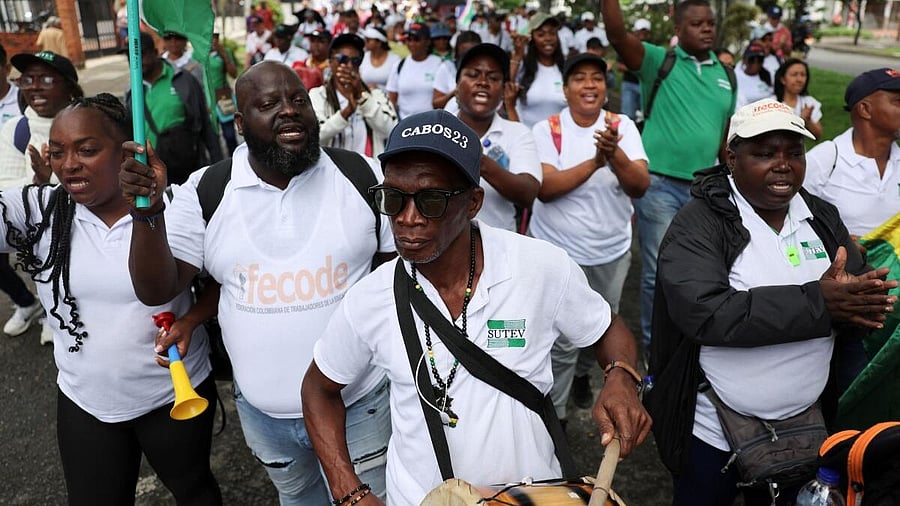
Afro-Colombians participate in a protest in support of the government of Colombian President Gustavo Petro, while COP 16 is taking place in Cali.
Credit: Reuters photo
Cali: Colombia and Brazil are pushing the United Nations COP16 nature summit under way in the city of Cali on Wednesday to officially recognize the contribution of Afro-descendant people in conserving the region's vast biodiversity.
The talks already recognize Indigenous peoples' leading role in preserving nature globally, with the new proposal seeking to give Afro-descendants similar recognition, as their traditional knowledge and lifestyles contribute to conservation.
"Descendants of slaves and Indigenous are agents of nature conservation," Brazil's Racial Equality Minister Anielle Franco told Reuters. "In fact, agents of conservation of our planet."
People of African descent occupy roughly 2 million square km (772,200 square miles) of rural land in Latin America, according to John Anton Sanchez, a researcher with the Black Communities Process (PCN), an umbrella group for community organizations.
That's an area larger than Mexico and it is more than 80% preserved thanks to Afro-descendant communities, he said.
"We have fought against an entire system that has wanted to extract and exhaust natural resources and all the biodiversity," said Marino Córdoba, a representative of Colombian Afro-descendant organization AFRODES, at COP16.
"We believe that being in the middle of biodiversity and nature makes us rich."
Brazil and Colombia's proposal under consideration would encourage parties to the U.N. Convention on Biological Diversity to engage with these communities and incorporate their traditional knowledge of sustainable practices into decision making.
"We have been doing this for more than 200 years since the first moment our ancestors arrived here in Colombia as slaves," said Laura Valentina Rojas, a youth activist at COP16.
"We understand this territory as our life and we love it and defend it."
The proposal also encourages parties to the United Nations talks to protect territories traditionally occupied by these communities.
Only about 80,000 sq km (30,900 sq miles) in the region occupied by Afro-descendants have formal community protection and recognition from their governments, according to Sanchez' figures.
Afro-descendant communities have long pressed for official recognition but are now gaining traction in the halls of power under the progressive administrations of President Luiz Inacio Lula da Silva in Brazil and President Gustavo Petro of Colombia, Franco said.
Franco worked with Francia Marquez, Colombia's first vice president of African descent, on the proposal.
"The fact that there are two women leading on issues like this one, in Brazil and Colombia, says a lot about this new era we're in," Franco said.